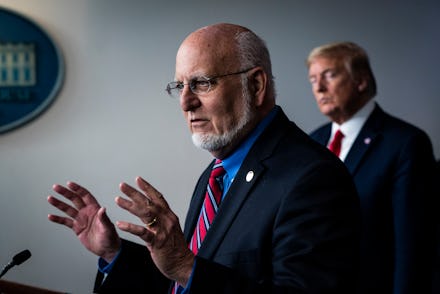Trump's nightly briefings have become ground zero for humiliating his medical experts

At this point in our COVID-infused timeline, few reasonable people actually watch President Trump's nightly coronavirus updates for useful information or an encouraging display of leadership. Instead, the briefings have become a sort of burlesque in which the president — often flanked by actual doctors — rants and raves about whatever petty grievance percolates to the top of his mind, and then briefly passes the microphone to his administration's medical experts who do their best to offer concrete coronavirus updates while still appealing to Trump's ego.
Suffice it to say, it's a needle that's become increasingly difficult to thread. Take Wednesday evening's briefing, for example.
But first, some context: Earlier this week, Centers For Disease Control Director Dr. Robert Redfield spoke with The Washington Post, where he warned that a winter resurgence of coronavirus would likely be "more difficult" than our current outbreak.
"There’s a possibility that the assault of the virus on our nation next winter will actually be even more difficult than the one we just went through," Redfield told the paper. "And when I’ve said this to others, they kind of put their head back, they don’t understand what I mean." He explained: "We’re going to have the flu epidemic and the coronavirus epidemic at the same time."
Trump, however, took apparent issue with the way Redfield's words were printed, shooting off a cryptic tweet Wednesday morning saying Redfield had been "misquoted" and would at some point be releasing a corrective statement. Puzzlingly, the president took aim at CNN, not the Post.
Either way, Redfield's statement never came. Instead, after calling the Post article "fake news" during his Wednesday briefing, Trump trotted out Redfield in person, ostensibly to have him disavow the interview.
"I do want to mention, Dr. Robert Redfield was totally misquoted in the media about the fall season and the virus," Trump insisted. "I spoke to him, he said it was ridiculous."
Except when it was his turn to speak, Redfield confirmed that he wasn't misquoted and stood by his initial assessment. The health crisis could be "more difficult," he explained, because the flu and coronavirus could possibly be spreading at the same time, but the situation would not necessarily be "worse." The main issue with the Post's story, Redfield said, was not his quote but the way the Post had framed his interview in their headline.
"The key to my comments and the reason that I really wanted to stress them was to appeal to the American public and to embrace the flu vaccine with confidence," he explained. "I didn’t say this was going to be worse," he added. "I said it was going to be more difficult." Minutes after Trump interrupted to declare again that Redfield had been "totally misquoted," Redfield confirmed to ABC News's Jonathan Karl that "I'm accurately quoted in The Washington Post."
In fact, this is not Redfield's first time having to navigate between the president's ego and public health concerns. In early March, the president visited Redfield at the CDC headquarters where Trump rambled about Fox News, complained about having been impeached, and smiled as Redfield offered glowing, saccharine praise of his "decisive leadership."
Indeed, this seems to be standard fare for the doctors charged with getting the nation through this pandemic. One false move, and Trump might publicly excoriate you to the press, as he did with Dr. Rick Bright, the former head of the Biomedical Advanced Research and Development Authority — the federal agency within the Department of Health and Human Services tasked with developing a coronavirus vaccine.
Shortly before Wednesday's briefing, Bright released a statement claiming he'd been removed from his position as political retaliation against his reluctance to promote Trump's much-touted but medically dubious hydroxychloroquine remedy for COVID-19.
"Sidelining me in the middle of this pandemic and placing politics and cronyism ahead of science puts lives at risk and stunts national efforts to safely and effectively address this urgent public health crisis," Bright wrote in his statement, which also urged the HHS inspector general to investigate his removal.
Bright's allegation, if true, would be stunning confirmation that the Trump administration is interfering in crucial medical research for pure political purposes. At Wednesday's briefing, after initially claiming he'd never heard of Bright to begin with, Trump interrupted Dr. Anthony Fauci — the director of the National Institute of Allergy and Infectious Diseases — who was asked by CBS News's Weijia Jiang why Bright had been transferred to the National Institute of Health when his "gifts" were evidently better suited for his previous role at BARDA.
"Why do you say he has great gifts?" Trump interjected. "Have you studied him? Have you reported on him?"
Fauci, remember, apologized for a "poor choice of words" last week after his own interview, which was in fact with CNN and which the president apparently took issue with. As the saying goes: If once is chance, and twice is coincidence, then three times is a pattern. If this is how the president treats the medical experts tasked with making sure hundreds of thousands of Americans don't lose their lives to coronavirus over the next few months, we're in trouble.